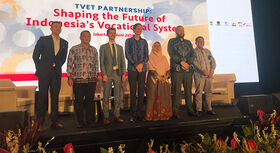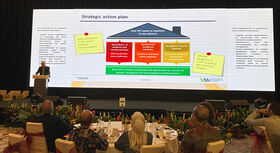BIBB reinforces its role in Indonesia as an internationally recognised centre of excellence for vocational education and training
13.06.2024
On 12 June, BIBB President Friedrich Hubert Esser gave a keynote address in Jakarta at the invitation of the Indonesian Ministry for Economic Affairs and the German Agency for International Cooperation (GIZ). The speech formed part of an international VET conference and was delivered in the presence of around 300 high-ranking participants from the fields of policy making and trade and industry and to a further online audience of about 250.
President Esser began by outlining the success factors for vocational education and training at a time of transformation. “We look back with pleasure and pride at what we have achieved together, and we are keen to continue to offer advice and active support for the reform of the Indonesian TVET system in future.”
Around 300 guests from the fields of policy making and trade and industry had been invited to attend the event, and BIBB took on a prominent role in its capacity as an international vocational education and training institution. Alongside the keynote address, BIBB expert Luca Jelic gave an expert talk. This focused on a long-term projection of the structure of the labour market and on Germany’s National Continuing Training Strategy, which was developed as a reaction to expected shifts in competency requirements.
During his keynote speech of just over 20 minutes, BIBB President Esser addressed current challenges in German vocational education and training. “2.9 million young adults aged under 35 have no vocational qualification, and this is a serious problem,” he stated. He then sketched out a possible strategic solution in the form of a concept for flexible, inclusive and excellent VET.
“The German dual system links the theoretical imparting of knowledge at school with the acquisition of practical occupational competencies in the workplace. It is and remains a role model for Indonesia,” said Professor Warsito, Deputy Minister of Human Development and Cultural Affairs, whose remit also covers reform of the vocational education and training system. However, it is by no means the case that Indonesia is simply copying concepts from Germany. “Reforming the TVET system is a task of national priority,” said Rudy Salahuddin, Deputy Minister at the Ministry for Economic Affairs. Various concepts had been put forward in this regard, ranging from training measures for training staff to the promotion of trade and industry participation structures in VET.
The conference also marked the conclusion of the GIZ project “TVET System Reform 2.0”, for which BIBB had been performing an active consultancy role since 2019. The aims of the project included the establishment of a VET governance mechanism based on the model of the BIBB Main Board. The successes which had been achieved were highlighted and accompanied by a colourful supporting programme. The key aspect of the latter was the ceremonial transfer of chairmanship of the Governance Mechanism to the ministry which has now assumed lead management responsibility.
The conference also showed the esteem in which BIBB is held internationally as a centre of excellence for vocational education and training. Networking with partner countries such as Indonesia constantly brings benefits for both sides, since dialogue is the only way to identify areas of potential for synergy in areas such as immigration for the purpose of training or qualified migration to the German labour market.
%202696_730x399px_rdax_80p.jpg)


